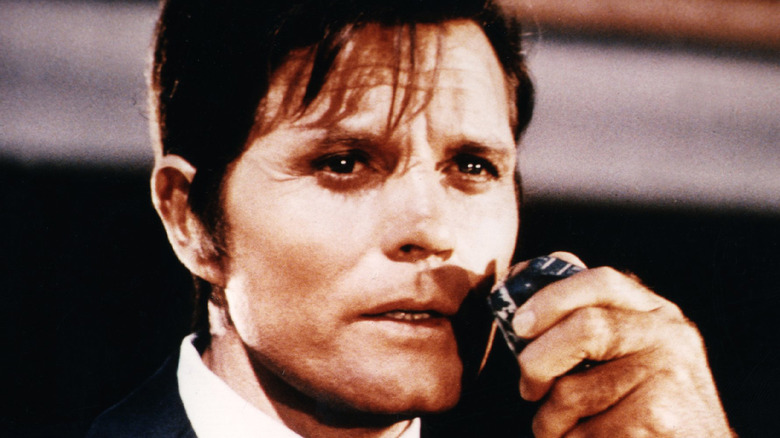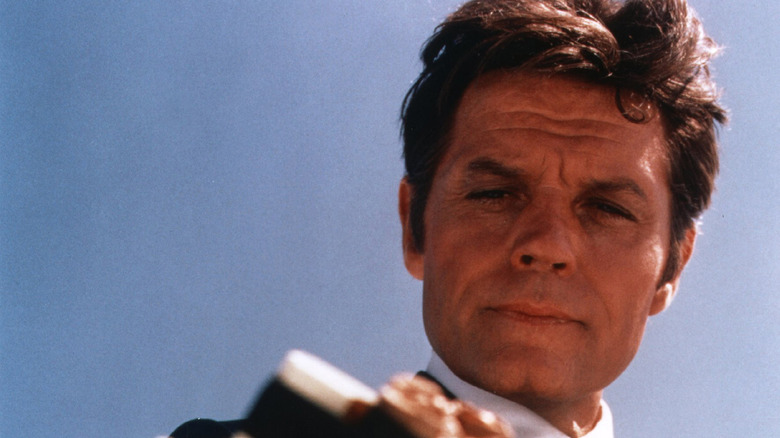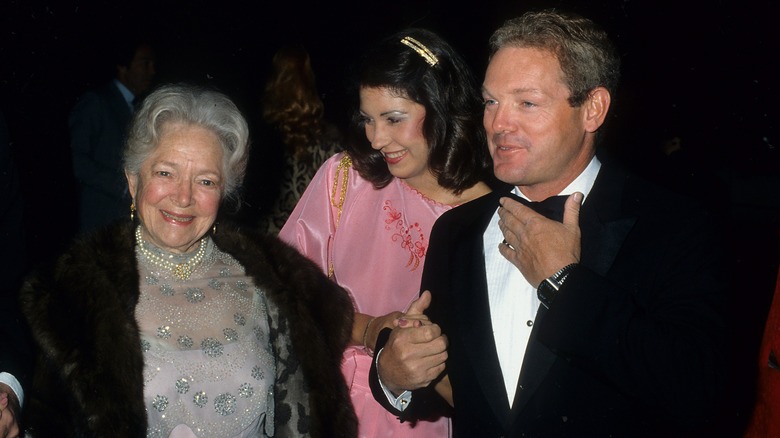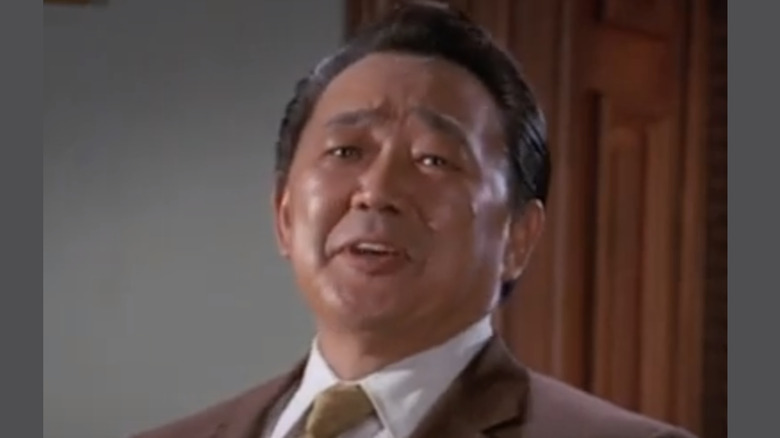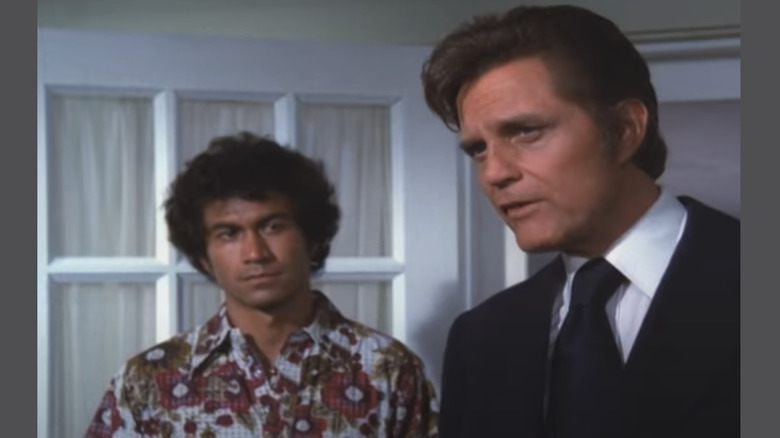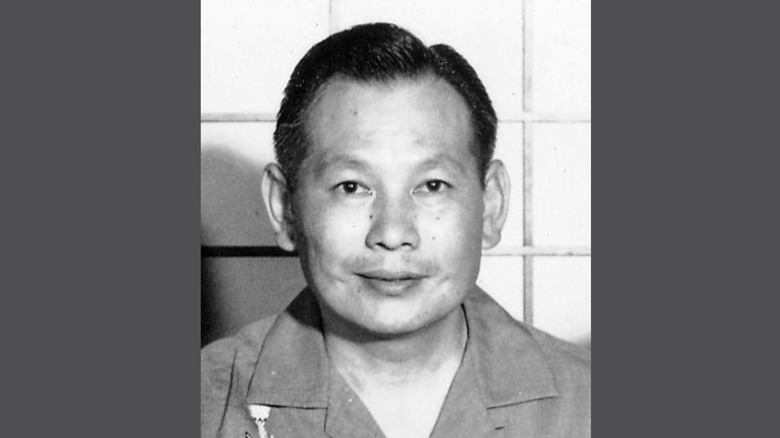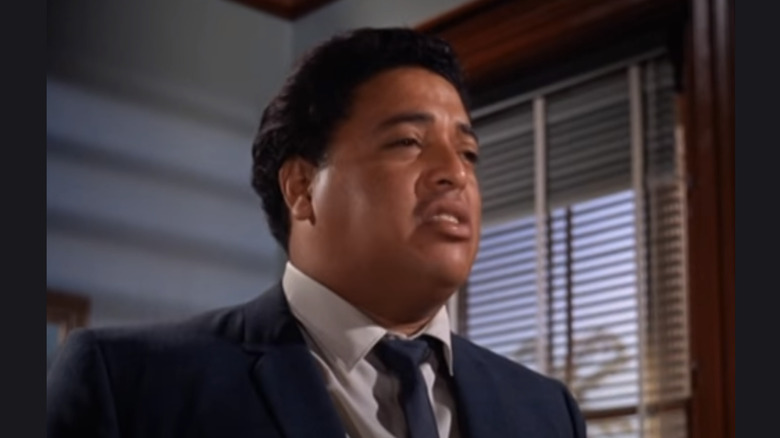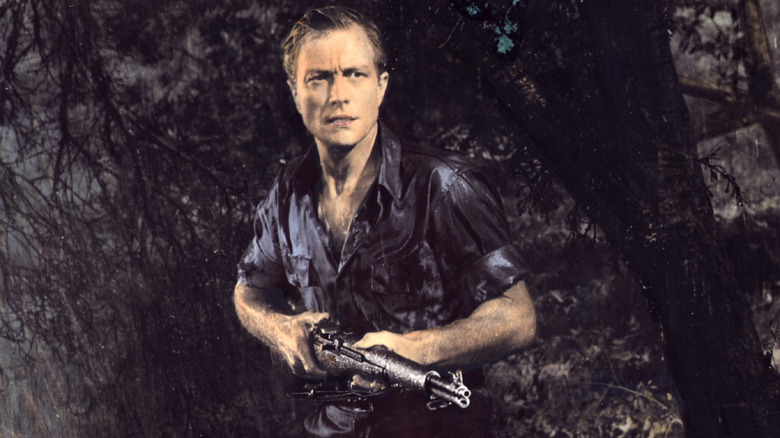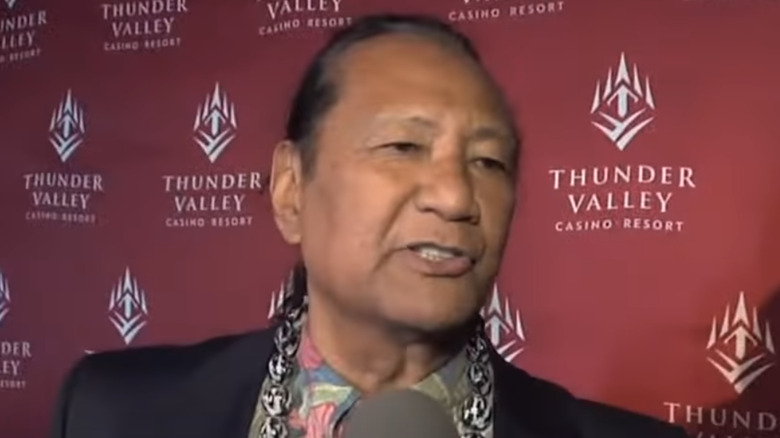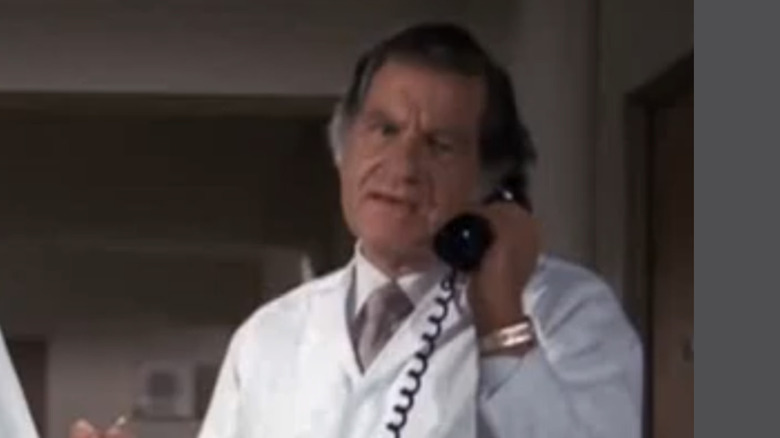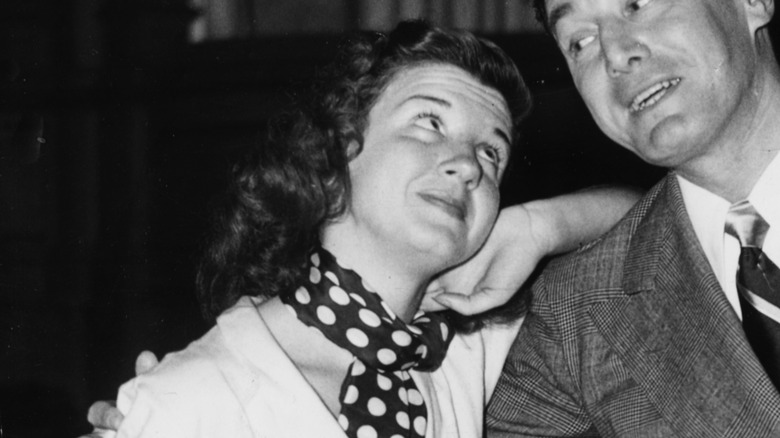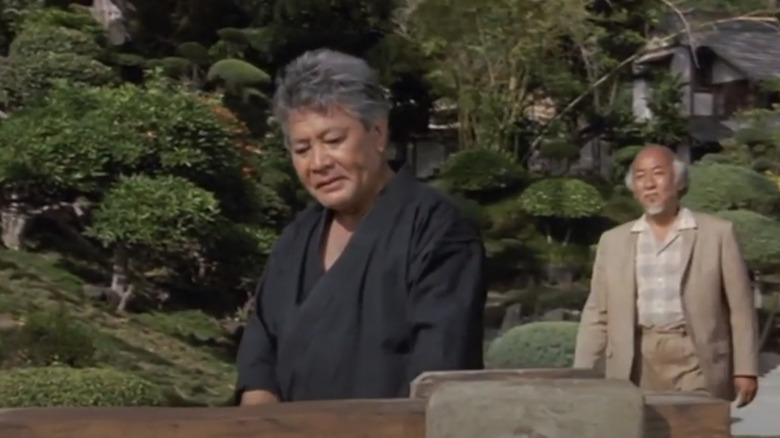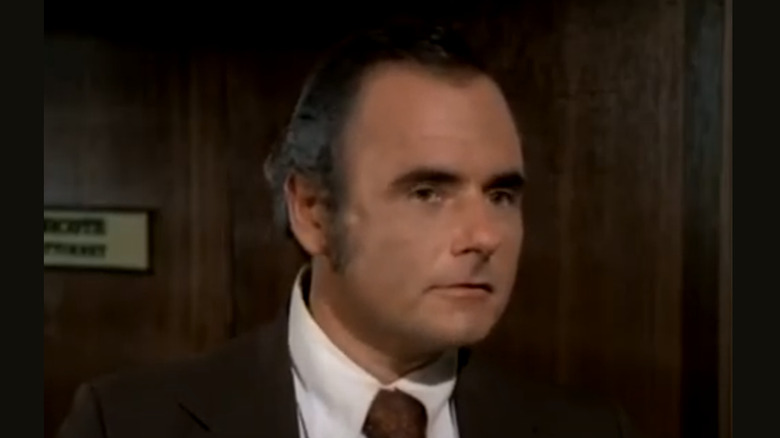Whatever Happened To The Original Cast Of Hawaii Five-O?
"Hawaii Five-O" is one of those classic television shows that never goes out of style. Part of what made the show so memorable was the setting — shooting a TV show on location in Hawaii just wasn't normal in 1968. In fact, the only reason the show was shot in Hawaii instead of on sets or lookalike locations somewhere else in the country was series star Jack Lord. According to The New York Times, Lord had it written into his contract that he had full control over all "dramatic decisions" regarding the show. The network didn't want to shoot in Hawaii; Lord insisted.
But it's not just the stunning scenery that set "Hawaii Five-O" apart. The cast was something special. As noted in television historian Horace Newcomb's book "Encyclopedia of Television," "Hawaii Five-O" was a "highly progressive" show for 1968, boasting a diverse cast that included not only native Hawaiian actors but also actors representing Hawaii's large Chinese American population.
Just as crucial to the show's ongoing success and lasting legacy was the cast's enduring charisma and talent. After a legendary 12-year run on TV (making it the longest-running police procedural show at the time), "Hawaii Five-O" ended in 1980. Here's what happened to the original cast of the show after that.
Jack Lord
"Hawaii Five-O" was Jack Lord's show. After a busy acting career that TCM notes had seen him appear in a James Bond film, theatrical productions, and dozens of TV shows, including "The Untouchables" and "Rawhide," Lord took on the lead role of Detective Steve McGarrett in 1968. The New York Times notes that Lord had full control over the series written into his contract, and served as unofficial producer and occasional director of the show over the course of its 12-year run.
When "Hawaii Five-O" ended in 1980, Lord produced and directed a television film called "M Station: Hawaii," which he hoped would be picked up as a new series. According to biographer Sylvia D. Lynch in the book "Jack Lord: An Acting Life," although Lord appeared in a cameo role, he intended to act mainly as a producer and director on the series. When the series wasn't picked up by the network, the Los Angeles Times reports that Lord simply retired and turned his creative energies to his painting — which was very successful, with several of his works sitting in museums around the world.
According to The Gazette, Lord and his wife Marie lived the rest of their lives together in Hawaii, where Lord passed away in 1998 at age 77. He never appeared in an acting role again in his lifetime, turning down multiple offers to cameo on another TV show set in Hawaii: "Magnum, P.I." (per TCM).
James MacArthur
Every fan of "Hawaii Five-O" knows that Detective Steve McGarrett ended many of the episodes by instructing his partner, Detective Danny Williams, to "Book 'em, Danno!" James MacArthur portrayed the straightlaced, boyish police officer on the show from its debut in 1968 to its penultimate season in 1979. (The show was canceled in 1980.)
As noted by The New York Times, MacArthur was the son of celebrated actress Helen Hayes, and was raised in and around the theater. He attended Harvard University but left school to pursue an acting career. Hawaii Magazine reports that MacArthur was considered a "rising star" in Hollywood when he was offered the role of Danny Williams after the original actor cast in the role (Tim O'Kelly, according to TCM) tested poorly. MacArthur took on the role from the second episode onward.
According to the Los Angeles Times, MacArthur saved much of his salary from the show and invested heavily in real estate in Hawaii, amassing a considerable fortune. Per TCM, MacArthur eventually grew bored with the character, leaving the show after its 11th season and returning to supporting roles on TV and on the stage for the rest of his career. He returned to the role of Danny Williams in a 1997 sequel to "Hawaii Five-O" in which the former detective had become governor of Hawaii, but the show was never aired. MacArthur passed away in 2010 at the age of 72.
Kam Fong Chun
Kam Fong Chun was born in the Kalihi neighborhood of Honolulu in 1918, and according to the Honolulu Police Department he was working as a boilermaker at the Pearl Harbor Shipyard when the Japanese attacked the United States on December 7, 1941. He survived the Pearl Harbor attack, but three years later lost his wife and children when two planes crashed into his home.
As reported by The New York Times, Chun joined the police force and served as a police officer until retiring in 1959 to pursue acting. According to author Karen Rhodes in her book "Booking Hawaii Five-O," he performed with the Honolulu Community Theatre group, where the series often turned for background actors, and didn't even have to audition for the role of Detective Chin Ho Kelly. He played the role until 1978, when, according to the Houston Chronicle, he felt the scripts had become "stale" and asked to be written off the show.
Chun acted sporadically after leaving "Hawaii Five-O," including (per the AV Club) a 1997 TV-movie sequel to the show, despite the fact that his character was famously killed off in his final appearance on the original series, as noted by the Los Angeles Times. Rhodes notes he hosted a morning radio show in Hawaii for several years in the 1980s, and even ran a humorous campaign for governor in 1988 using the slogan "Give a damn — vote for Kam!" He passed away in 2002 at the age of 84.
Herman Wedemeyer
Herman Wedemeyer had a remarkable career. As noted by the Honolulu Star-Bulletin, Wedemeyer first gained fame as a football player. He was named an All-American while playing for St. Mary's College in California in 1945. According to The Washington Post, he was known for being very difficult to defend against, earning the nicknames "Squirmin' Herman" and "The Hula-Hipped Hawaiian."
Later named to both the National Football Foundation College Hall of Fame and the Hawaii Sports Hall of Fame, Wedemeyer returned to Hawaii in the later 1960s and successfully ran for Honolulu City Council in 1968, then ran for the state's House of Representatives and won in 1970 and again in 1972. By this time, Wedemeyer was already appearing in small roles on "Hawaii Five-O," according to author Karen Rhodes in "Booking Hawaii Five-O." His work on the show caused him some political trouble. Author Sylvia D. Lynch notes in her book "Jack Lord: An Acting Life" that in 1972, the local television station pulled an episode of "Hawaii Five-O" from the air because Wedemeyer's opponent in the House of Representatives race complained that his appearance on the show violated the FCC's requirement that political candidates receive equal air time.
According to Rhodes, Wedemeyer began appearing regularly as a character named "Duke," and eventually solidified the character of Duke Lukela during the fifth season. He remained with the show until its cancellation in 1980, and only appeared in two more roles before his death in 1999 at the age of 74.
Harry Endo
As noted by author Roger Sabin in the book "Cop Shows," Harry Endo was working as a savings and loan executive when he was cast as Che Fong in Season 2 of "Hawaii Five-O" — but he wasn't unfamiliar to local television viewers. Author A.J. McWhorter reports in his book "Honolulu Television" that Endo had also worked as a newscaster for Honolulu TV station KHVH in the late 1960s, and he had appeared in several local commercials for Territorial Savings Bank. In fact, according to Do You Remember, Endo was offered a spot on "Hawaii Five-O" while he was at work on a commercial.
Endo played Fong, a forensic scientist, until the show's end in 1980. According to The Hour, Endo appeared in a few small TV roles after 1980, including one episode of "Magnum, P.I.," but left the industry by the end of the decade. According to an article in Hawaii Magazine reproduced on The Hawaii Five-O Home Page, by the 1990s Endo had returned to his banking roots and was working as the vice president of marketing at the Honolulu Federal Savings and Loan Association.
According to the Toronto Star, Endo passed away in 2009 at the age of 87 after suffering a stroke.
[Image via Wikimedia Commons | Cropped and scaled | CC BY-SA 3.0]
Gilbert Lani Zulu Kauhi
According to the Honolulu Star-Bulletin, Gilbert Lani Kauhi was a "beach boy" in Waikiki alongside fellow entertainer Don Ho in the early 1960s. Nicknamed "Zulu" in high school, Variety reports that Kauhi was a natural entertainer known for singing for any crowd he could find. He also worked as a disc jockey for a radio station and even tried his hand at stand-up comedy.
The Los Angeles Times reports that Zulu, as he was known professionally, was cast as Detective Kono Kalakaua for the pilot of "Hawaii Five-O." He played the role for four seasons, but author Sylvia D. Lynch notes in her book "Jack Lord: An Acting Life" that he was fired in 1971 after getting into an altercation with publicist Len Weissman and using racial slurs. Zulu expressed frustration with the limited nature of his role on the show.
Kauhi created a nightclub act and continued to perform at local hotels with great success, but his life took a downward turn in the 1980s when he was convicted of negligent homicide after killing a bicyclist with his car. He received one year's probation, but his health began to fail. He was diagnosed with high blood pressure and had heart surgery in 2000. He was also diagnosed with diabetes and had to go on dialysis. A kidney transplant wasn't sufficient, and he was waiting for a second kidney when he passed away in 2004 at the age of 66.
Richard Denning
As noted by author Karen Rhodes in "Booking Hawaii Five-O," Richard Denning broke into acting in an unusual way: He won a contest. After doing some acting in college and working in his father's clothing business, Denning entered an acting contest on a radio station (according to Variety, the contest was called "Do You Want to Be an Actor?") and won. This eventually led to a contract with Paramount Pictures. The New York Times reports that Denning enjoyed a steady if unspectacular career — he appeared in 50 films before enlisting in the Navy for World War II, and appeared in several high-profile films in the 1940s and 1950s, including "Some Like It Hot" and "An Affair to Remember." He migrated to television work in the 1960s and landed the role of the governor of Hawaii on "Hawaii Five-O" in 1968 — his final acting role.
According to the Sun-Sentinel, since the show was shot on location in Hawaii, Denning and his wife moved to Maui instead of commuting back and forth from the mainland. When the show ended in 1980, Denning was 66 years old, and the couple chose to remain in Hawaii. He went on to work with the Boy Scouts of America as an executive director and serve on the Maui Chamber of Commerce. He passed away in 1998 at the age of 85.
Al Harrington
Variety reports that Al Harrington was born Tausau Ta'a in American Samoa in 1935. He moved to Honolulu in 1938, and after graduating college, Harrington taught at the University of Hawaii while pursuing a career as an entertainer. Billing himself "The South Pacific Man," Harrington worked the circuit in Waikiki, dancing and singing.
His first television role was "Hawaii Five-O," initially in small bit parts. In 1972, Deadline notes that Harrington joined the series as a regular in the role of Detective Ben Kokua, which he played until 1975. The New York Post reports that he was brought in to replace Zulu, who had been fired from the show after an altercation with a publicist, according to author Sylvia D. Lynch's "Jack Lord: An Acting Life."
After leaving "Hawaii Five-O," Harrington continued to act. He appeared on classic shows such as "The Jeffersons," "Magnum, P.I.," and "Scrubs," as well as several films, including "Forrest Gump." When CBS rebooted "Hawaii Five-O," Harrington signed on to play a new character, surf shop owner Mamo Kahike, from 2011 to 2018. in her book "Booking Hawaii Five-O," author Karen Rhodes notes that Harrington continued to perform as "The South Pacific Man" well into the 1990s, and appeared on a float during the 1990 Honolulu Thanksgiving Day parade, singing. The Wrap reports that his last role was on the Disney+ series "Doogie Kamealoha, M.D." He died in 2021 at the age of 85.
Al Eben
Born in Philadelphia, Pennsylvania, in 1915, Al Eben joined the cast of "Hawaii Five-O" as medical examiner Doc Bergman in 1971 and continued in the role until 1979 (per "Booking Hawaii Five-O" by Karen Rhodes). Eben was never a big name actor, but the Los Angeles Times (via Legacy.com) notes that he had a long and successful career, appearing in Broadway plays such as "Pins and Needles" and many films — including a small role in the all-time classic "Citizen Kane" (via TCM). He also appeared in a long list of commercials on television.
When Eben scored the role, he and his wife, Sylvia Kunin, moved to Hawaii where the show was filmed and lived there for four years, moving back to Los Angeles in 1975 (per the Los Angeles Times). After "Hawaii Five-O" ended, Eben only had two more acting roles, appearing in a 1999 episode of "Everybody Loves Raymond" (according to the book "Everybody Loves Raymond: Our Family Album") and in the 2001 film "Corky Romano," his final role.
After retiring from acting, Eben spent his time serving his community, working with the Santa Monica Emeritus Players and reading for elementary school and kindergarten students — activities he kept up until he passed away in 2003 at the age of 88.
Peggy Ryan
Author Karen Rhodes notes in her book "Booking Hawaii Five-O" that the role of Steve McGarrett's secretary on "Hawaii Five-O" was recast for Season 2 of the show in 1969. Patricia Tuscano played the role for one episode, and then veteran actress Peggy Ryan took over. She played the role until 1976.
The Guardian reports the role was a garnish to an accomplished career. Ryan began acting at the age of 5 and appeared in her first feature film when she was just 13. Over the course of two decades she appeared in dozens of films, including an uncredited role in "The Grapes of Wrath" in 1940. An accomplished dancer and comedian, she attained fame as Donald O'Connor's dancing partner in several 1940s movies.
Variety reports that her last film role was in "All Ashore" in 1953 opposite Mickey Rooney. In 1958, she married newspaper columnist and novelist Eddie Sherman and moved to Honolulu, where she taught dancing and choreographed local stage productions until she was cast as Jenny Sherman, according to the Los Angeles Times. After leaving the show, she moved to Las Vegas in the 1980s, where she taught dance and produced dance revues, remaining active in both until her death in 2004 at age 80 (per the Las Vegas Sun).
Danny Kamekona
As noted by TCM, Hawaii native Danny Kamekona made his acting debut on "Hawaii Five-O" in 1968. According to the book "Booking Hawaii Five-O," Kamekona played a wide range of small roles on the show — 31 in all — but is most frequently recalled as Sergeant Nick Noble.
Kamekona was with "Hawaii Five-O" until the series ended in 1980, but he appeared on a wide range of other television shows, including "Sanford and Son," "Barnaby Jones," and "Magnum, P.I." Kamekona was just as busy after "Hawaii Five-O" ended, according to Heavy.com, racking up credits on both film and television. His most famous role came in 1986, when he played the villain Sato in "The Karate Kid Part II." He also had memorable appearances in films such as 1987's "Black Widow," 1990's "Problem Child," and "Honeymoon in Vegas" with Nicolas Cage.
His final acting role was as a series regular in the show "Burke's Law" in 1994 to 1995. According to the Los Angeles Times, Kamekona died of natural causes in his sleep in 1996 at the age of 60. Kamekona had recently had heart surgery to repair a faulty valve, and his doctor had advised him to take it easy, but in the weeks before his death he kept up a busy schedule of filming and promoting projects.
Glenn Cannon
According to author Karen Rhodes in her book "Booking Hawaii Five-O," Glenn Cannon joined the cast of "Hawaii Five-O" in Season 4, creating the role of assistant district attorney John Manicote (who later received a promotion to attorney general). Before that, Cannon had appeared in many Broadway shows and stage plays as well as doing some television work in the 1950s.
Cannon was as much an educator as an actor. According to Rhodes, he moved to Hawaii in 1968 to accept the role of Professor of Drama at the University of Hawaii, a post he kept after landing "Hawaii Five-O" and one he remained in until his death in 2013, according to The Honolulu Star-Advertiser. After the series ended in 1980, Cannon continued to teach acting, and also directed more than 160 local community theater plays. The University of Hawaii Foundation notes he served as president of his local Screen Actors Guild for more than 20 years.
According to TV Guide, he also continued to act, appearing in shows such as "Magnum, P.I." His final screen credits came on the show "Lost"; in the book "Finding Lost," author Nikki Stafford notes he portrayed a priest in the 2004 episode "The Moth" and a character billed as "Old Scooter Man" in the 2005 episode "Exodus, Part 2." Cannon passed away in April 2013 at the age of 80.
